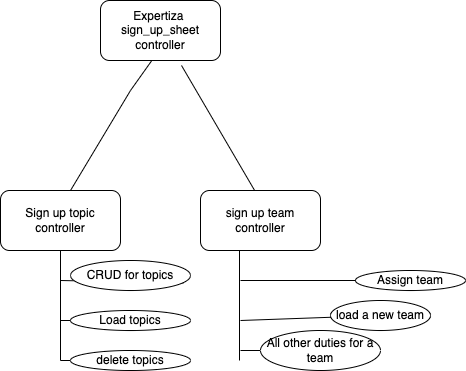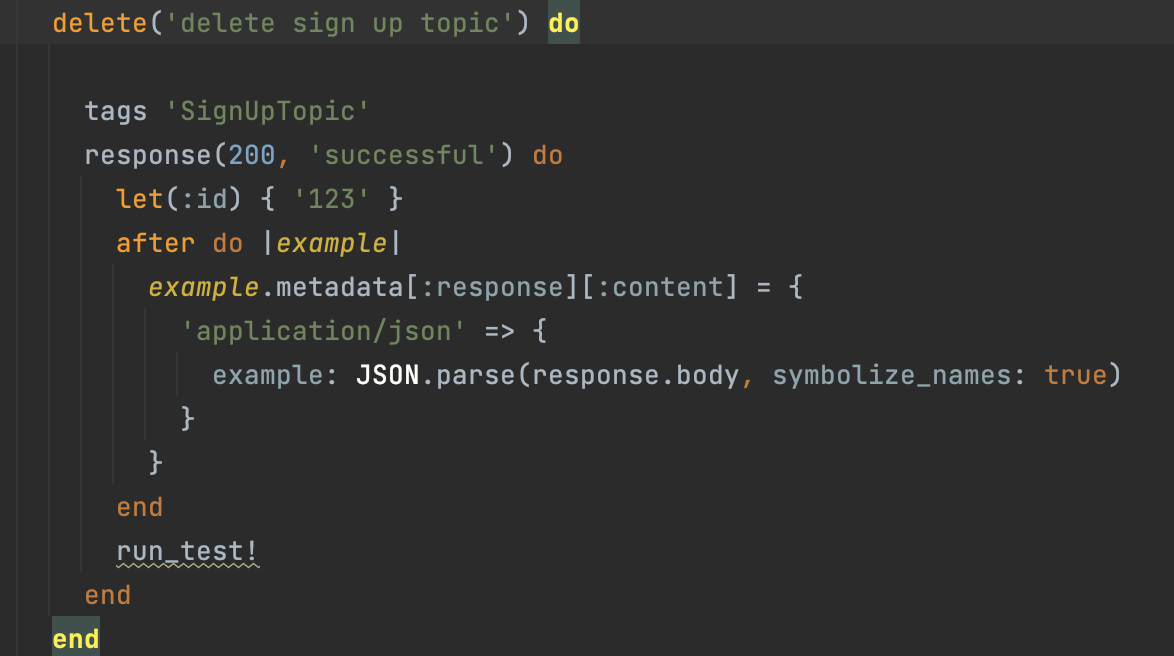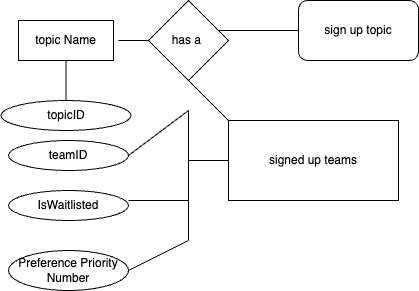CSC/ECE 517 Spring 2023 -E2339. Reimplement signed up teams controller and sign up topics controller.rb: Difference between revisions
No edit summary |
No edit summary |
||
| Line 1: | Line 1: | ||
== '''Project Overview''' == | == '''Project Overview''' == | ||
This project is really number E2340 (not E2339!). | |||
=== '''Background''' === | === '''Background''' === | ||
The signup_sheet_controller in expertiza is responsible for managing the signup sheet for an assignment. The controller includes functions to add, edit, and delete topics for the assignment, as well as perform team and deadline management functions. One important feature of the signup sheet is the ability for teams to sign up for topics. The controller includes methods to handle this functionality, including checking if there are available slots for a particular topic, adding the team to the waitlist if there are no available slots, and updating the signup sheet accordingly. In addition to signing up for topics, teams also have the ability to drop a topic. If a team drops a topic and there are teams on the waitlist for that topic, the first team on the waitlist (based on the creation date) will be automatically signed up for the topic. The controller includes methods to populate the objects needed for the signup sheet for a particular assignment. This could include retrieving information about the assignment, the topics, and the teams that have signed up for each topic. Most importantly, only instructors can create, update and delete the topics. | The signup_sheet_controller in expertiza is responsible for managing the signup sheet for an assignment. The controller includes functions to add, edit, and delete topics for the assignment, as well as perform team and deadline management functions. One important feature of the signup sheet is the ability for teams to sign up for topics. The controller includes methods to handle this functionality, including checking if there are available slots for a particular topic, adding the team to the waitlist if there are no available slots, and updating the signup sheet accordingly. In addition to signing up for topics, teams also have the ability to drop a topic. If a team drops a topic and there are teams on the waitlist for that topic, the first team on the waitlist (based on the creation date) will be automatically signed up for the topic. The controller includes methods to populate the objects needed for the signup sheet for a particular assignment. This could include retrieving information about the assignment, the topics, and the teams that have signed up for each topic. Most importantly, only instructors can create, update and delete the topics. | ||
Latest revision as of 13:23, 6 May 2023
Project Overview
This project is really number E2340 (not E2339!).
Background
The signup_sheet_controller in expertiza is responsible for managing the signup sheet for an assignment. The controller includes functions to add, edit, and delete topics for the assignment, as well as perform team and deadline management functions. One important feature of the signup sheet is the ability for teams to sign up for topics. The controller includes methods to handle this functionality, including checking if there are available slots for a particular topic, adding the team to the waitlist if there are no available slots, and updating the signup sheet accordingly. In addition to signing up for topics, teams also have the ability to drop a topic. If a team drops a topic and there are teams on the waitlist for that topic, the first team on the waitlist (based on the creation date) will be automatically signed up for the topic. The controller includes methods to populate the objects needed for the signup sheet for a particular assignment. This could include retrieving information about the assignment, the topics, and the teams that have signed up for each topic. Most importantly, only instructors can create, update and delete the topics.
Project Objective
Our task is to reimplement these major functionalities for signing up topics and teams in Rails API which will then be consumed by a React based frontend. The current business logic in the controller is complex and involves multiple things in a single function which contradicts Single-Responsibility principle. We decided to split the existing controller into two separate controllers, one for signup_topics and one for signed_up_teams. Some of the groundwork required for signup_topics controller is already completed previously. We will be working on finetuning the signup_topics controller further by writing robust tests and making the code more DRY and in alignment with Ruby guidelines. Additionally, we will be implementing the signed_up_teams controller to address the association between topics and teams.
Previous Work
The exisiting signup_sheet_controller from the original expertiza repo is split into two controllers, signup_topics and signed_up_teams. The foundation work is done on signup_topics controller which can be found at (https://expertiza.csc.ncsu.edu/index.php/CSC/ECE_517_Spring_2023_-_E2316._Reimplement_sign_up_sheet_controller.rb)
Project Implementation
Design Improvements for "sign_up_topics controller"
Improvement 1:
We propose to add the filtering functionality to the existing index method of the sign_up_topics. The filter functionality will allow users to retrieve a subset of sign_up_topics based on certain criteria such as assignment ID and topic identifiers. This will improve the usability of the API and provide more flexibility to the user in retrieving data.
Rationale:
The index method currently retrieves all sign_up_topics and returns them in the response. However, in many cases, the user may only want to retrieve a subset of sign_up_topics that meet certain criteria. By adding the filter functionality, users can retrieve the data they need more efficiently and effectively. Additionally, the filter functionality will follow a RESTful approach and be consistent with the existing API design. It will allow users to specify the filtering criteria as query parameters in the URL, which is a common convention in RESTful APIs.
By making this decision, we don't have to expose a separate endpoint for the filtering functionality like it is being currently done. Furthermore, the filter functionality will be implemented using a private method get_selected_topics that uses the where method to retrieve the desired sign_up_topics based on the filtering criteria. The resulting data will be returned in the response as a JSON object.
Overall, the addition of the filtering functionality to the index method will enhance the usability and flexibility of the API, and will be consistent with RESTful API design principles.
| method name | description | improvement |
|---|---|---|
| filter | filters topics based on assignment id (required) and topic identifiers (optional) | move to index |
Current implementation:
# GET /sign_up_topics def index @sign_up_topics = SignUpTopic.all render json: @sign_up_topics end
def filter
get_selected_topics
render json: {message: 'All selected topics have been loaded successfully.', sign_up_topics: @stopics}, status: 200
end
private
def get_selected_topics
if params[:assignment_id].nil?
render json: {message: 'Assignment ID is required!' }, status: :unprocessable_entity
elsif params[:topic_ids].nil?
@stopics = SignUpTopic.where(assignment_id: params[:assignment_id])
else
@stopics = SignUpTopic.where(assignment_id: params[:assignment_id], topic_identifier: params[:topic_ids])
end
end
Improved implementation:
Will be added in the future once we implement it.
Improvement 2:
We also propose to add the filtering functionality for the deleting of topics to the existing destroy method of the sign_up_topics same as for the index method.
Rationale:
The "delete_filter" method and the "destroy" method both perform similar actions, which is to delete a sign up topic. Therefore, it makes sense to combine them into a single method to reduce code duplication and improve the maintainability of the codebase.
By merging the two methods, we can eliminate the need for a separate route and controller action to handle the deletion of sign up topics based on specific criteria. The combined method can handle all types of deletion requests, whether it is deleting a single sign up topic or multiple topics based on specific criteria.
Furthermore, by consolidating the functionality into a single method, we can reduce the complexity of the controller and make it easier to understand and maintain in the future. This simplification can also lead to improved performance and reduced resource consumption, as fewer controller actions need to be executed to achieve the same result.
| method name | description | improvement |
|---|---|---|
| delete_filter | deletes topics based on assignment id (required) and topic identifiers (optional) | move to destroy |
Current implementation:
def destroy
if @sign_up_topic.destroy
render json: {message: "The topic has been deleted successfully. "}, status: 200
else
render json: @sign_up_topic.errors, status: :unprocessable_entity
end
end
def delete_filter
#filters topics based on assignment id (required) and topic identifiers (optional)
get_selected_topics
@stopics.each(&:delete)
render json: {message: 'All selected topics have been deleted successfully.', sign_up_topics: @stopics }, status: 200
end
Improved implementation:
Will be added in the future once we implement it.
Improvement 3:
Making the tests thorough and robust. Check the changes in data after performing operations and also checking the valid response statuses.
Rationale:
1. The existing tests will need to be modified to reflect the changes mentioned in aforementioned design decisions. That includes getting rid of the tests for filter and delete_filter endpoints. The existing tests for GET and DELETE will be modified accordingly.
2. We will add appropriate response statuses to each test. For e.g., returning '204 No Content' for the delete test when the topic is deleted successfully rather than using '200 OK' status.
3. We will make each test robust by making sure the changes after performing certain operations are getting reflected. For e.g., Testing that the response body does not contain the deleted sign-up topic data after the delete request is successful.
Current implementation:
Current implementation of DELETE test:
Improved implementation:
Will be added in the future once we implement it.
Signed Up teams Controller
The signed up teams controller will be having the following functionalities
Index - this will filter the topics based on the team ID.
Create - this will create a sign up team.
Update - this will update the signed up team.
Delete - this will destroy the signed up team.
A basic E/R Diagram for the same is shown :
Test Plan
Testing for signup_topics
1. Test index action:
Test that it returns a JSON response with HTTP status code 200.
Test that it returns all sign-up topics in the database.
Test create action:
2. Test that it creates a new sign-up topic in the database with valid parameters.
Test that it creates a new sign-up topic in the database with valid parameters.
Test that it returns a JSON response with HTTP status code 201.
Test that it returns an error message with HTTP status code 422 when invalid parameters are passed.
3. Test update action:
Test that it updates an existing sign-up topic in the database with valid parameters.
Test that it returns a JSON response with HTTP status code 200.
Test that it returns an error message with HTTP status code 422 when invalid parameters are passed.
4. Test destroy action:
Test that it deletes an existing sign-up topic from the database with a valid ID.
Test that it returns a JSON response with HTTP status code 200.
Test that it returns an error message with HTTP status code 422 when an invalid ID is passed.
Testing for signed_up_teams
1. Test that the index action returns a JSON response with HTTP status code 200.
Test that it returns all sign-up teams in the database.
Test that it returns the sign-up team with the requested ID.
Test that it returns an error message with HTTP status code 404 when an invalid ID is passed.
2. Test that the create action creates a new sign-up team in the database with valid parameters.
Test that it returns a JSON response with HTTP status code 201.
Test that the sign-up team is saved in the database.
Test that it returns an error message with HTTP status code 422 when invalid parameters are passed.
3. Test that the update action updates an existing sign-up team in the database with valid parameters.
Test that it returns a JSON response with HTTP status code 200.
Test that the sign-up team is updated in the database.
Test that it returns an error message with HTTP status code 422 when invalid parameters are passed.
4. Test that the destroy action deletes an existing sign-up team from the database with a valid ID.
Test that it returns a JSON response with HTTP status code 200.
Test that the sign-up team is deleted from the database.
Test that it returns an error message with HTTP status code 404 when an invalid ID is passed.
Future Plan
The proposed implementation approach will prioritize the following hierarchy:
1.The sign up topic controller will be refined to facilitate smooth merging into the code.
2. Development efforts will be directed towards the signed up teams controller, utilizing the aforementioned design as a foundation. While the design may undergo revisions, the core functionalities will remain consistent.
3. Finally, the front-end will be implemented.
Relevant Links (previous implementation)
Github Repository: https://github.com/anuj672/reimplementation-back-end
Pull Request: https://github.com/expertiza/reimplementation-back-end/pull/25
Video1 : https://youtu.be/ZAh80Gj5A5U
Video2: https://youtu.be/1IFXC7DAljI
Group
Mentored by
Krishna Saurabh Vankadaru
Group members
Anuj Naresh Chetwani
Indira Pimpalkhare
Tejas Prabhu


